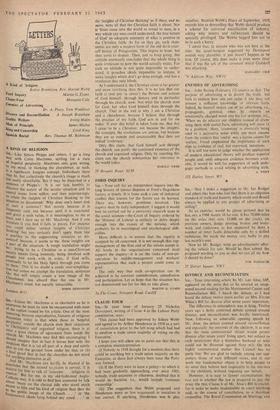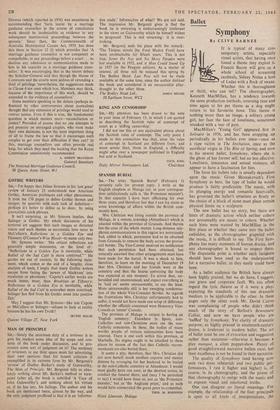DIVORCE AND RECONCILIATION Sin.--Your interesting article by Mr. Leo Abse.
MP, appeared on the same day as he secured an unop- posed second reading for his Matrimonial Causes and Reconciliation Bill. I heard the debate, as I had heard the debate twelve years earlier on Mrs. Eirene White's Bill for divorce after seven years' separation.
The difference in atmosphere was st, iking. Twelve years ago a hotly contested debate centred around divorce, and reconciliation was hardly mentioned. Now, following an admirable opening speech by Mr. Abse, the debate centred around reconciliation and especially the interests of the children. It is true that the most controversial clause would permit divorce after seven years' living apart, but subject to such restrictions that a blameless husband or wife could not be divorced against their will. On this highly controversial matter this Council has no party line. We are glad to include among our sup- porters those of very different views, and in our work our fundamental object is to help people to do what they believe best (especially in the interests of the children), without imposing our beliefs.
However, it is easy to favour reconciliation: the real test is whether the law is prepared to pay the price. On this, Clause 6 of Mr. Abse's Bill is crucial, for it seeks to make inadmissible in court anything said, in the course of conciliation, to a marriage counsellor. The Royal Commission on Marriage and
Divorce (which reported in 1956) was unanimous in recommending that 'facts learnt by a marriage guidance counsellor in the course of conciliation work should be inadmissible as evidence in any subsequent matrimonial proceedings between the spouses.' Since then, the Commonwealth of Australia Matrimonial Causes Act, 1959, has done this there in Section 12 (i) which provides that 'A marriage guidance counsellor is not competent or compellable, in any proceedings before a court ... to disclose any admission or communication made to him in his capacity as a marriage guidance coun- sellor.' It was encouraging that in the recent debate the Solicitor-General said that though the House of Commons and the courts were jealous of extending a field of privilege 'nevertheless, the suggestions made in Clause 6 are ones which hon. Members may think, because of the importance of this work, should be extended to the evidence of counsellors.'
Some members speaking in the debate (perhaps in- fluenced by other controversies about journalists) thought that any extension of privilege would tend to restrict justice. Even if this is true, the fundamental question is which matters more—reconciliation or justice? Provided of course that no one attempts to put pressure on estranged couples, who must make their own decisions, is not the most important thing of all to frame the law so that it encourages such couples to get over their difficulties if they can? In this, marriage counsellors can often provide real help, for which they need the backing that the Royal Commission unanimously recommended.
A. JOSEPH BRAYSHAW
General Secretary The National Marriage Guidance Council, 58 Queen Anne Street, WI



































 Previous page
Previous page